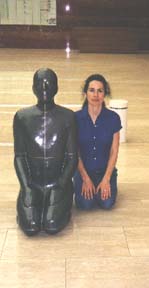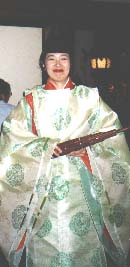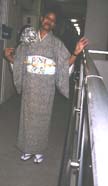America e Kaerimasu!
Previous Japan Letter | Next
(and final) Letter | Japan Snapshots | Japan
Letter Index | Home Page
| contact
6.10.99
JAPAN LETTER #4
Yes, I've waited way too long to write this and there is way too
much to tell! It feels as if more things have happened since April
when I wrote the previous Japan letter, than happened during the
whole rest of my stay here. I am finally becoming comfortable living
here, and my command of the language, though far from fluent, has
improved to the extent that I can communicate my basic needs in most
situations. I have also begun to have propositions for many
collaborations and enticing projects with Japanese artists, and I
have lots of ideas brewing about things I want to do and see. All
this, and now it's almost time to go home! Only about a month left
here in Tokyo, and because time has clearly increased its speed
(don't you think so?), that will be over in no time at all!
GAIKOKUJIN TOMODACHI!
It's funny how long it can take to feel at ease in a place. And
then suddenly-- you can't remember when it happened-- but you find
yourself under the delusion that you fit in. I've noticed myself
following the same pattern of many other people who's accounts I've
read or heard. I felt like such a foreigner when I arrived, and now I
actually have an unnatural feeling when I find myself surrounded by
other foreigners. On more than one occasion, I've caught myself
remarking to a Japanese friend, "Wow, look at all those
gaijin!" "Gai" means "foreign", "koku" means country, "jin"
means person. Gaijin is the (often derogatory) shortened word
for the (neutral) Gaikokujin. I remember, during my earlier
months here, that I often found myself doing something involuntarily.
I would see some American or European-looking person approaching on
the street, and I would just give them a little nod, like a "Hello."
It was the same exact thing that I used to hate when Black people did
it to me in the States. I used to think "I don't know you. Why are
you acting as if we are friends or family or something?" And now,
here I was doing the exact same thing to people I didn't know! I
think it just came out of a feeling of, "they might have something in
common with me- here I am in a place where I can't communicate with
anyone, and this is a person who might be able to understand me or
who might share a common experience with me." Funny, that I had to go
all the way to Japan to fully understand what was going through those
Black people's minds when they would nod at me in the States! Not
that I didn't understand it intellectually before. But being in Japan
and nodding involuntarily to some stranger because they didn't look
Japanese made me understand much more deeply. Those Black people were
nodding at me because they went through life feeling misunderstood by
and unable to communicate with the White people around them. I didn't
get it because I never felt that way. But how would they know that
about me? I certainly didn't have anyway of knowing how the people I
was nodding at here felt about being in Japan. My body just had an
involutary gut reaction to the way they looked, which caused me to
nod. There was really no thinking involved. So now I understand.
But at some point, the nodding stopped. I can't remember when, but
it's done. I suppose it's because, as I made friends and associates
here, most of them turned out to be Japanese. Other than my
neighbors, it wasn't until recently that I had many gaijin
friends to speak of. Many foreigners living in Japan like to hang out
with other foreigners and have more non-Japanese friends than they do
Japanese. They move into gaijin ghettos, go to gaijin
bars, shop at supermarkets that cater to gaijin etc, But, true
to the way I operate at home, I made friends here based on what
people do and what their interests are. So most of my friends are
musicians, or other artists or friends and family of those artists.
Although a few of the composers I made friends with are Americans,
since this is Japan, most of them are Japanese.
|
But during the last month or so, I've connected with some
very special non-Japanese new friends. Most notably, a
choreographer named Maureen Freehill from Hawaii (with whom
I did a collaboration on a Butoh piece) and a choreographer
named Sally Gross from New York who is here on the same
fellowship I have. Both of these women have been wonderful
companions, and reminded me how fun it is to have someone
with whom I can talk in depth about minutia, and with whom I
can SHOP! Also, because they are both wonderful artists,
I've had the pleasure of discussing work in detail that goes
beyond the English capabilities of many of my Japanese
friends and far beyond my capabilities in Japanese. I have
also finally been able to spend some time with a very old
friend (from back in my Boulder, CO days). Eric Jacobsen and
his wife Ayako were having their second baby when I first
arrived, but things have finally settled down for them to
the point that we could get together. The whole family is
adorable, and I've had some great times bopping around with
Eric. He composes music for children's videos and
television, and he even let me do a voice-over for one of
those goofy Japanese TV commercials I'm always making fun
of.
|

Maureen w/statue
at ICC
|
|

Donna Ozawa's used waribashi
(disposable chopstick) sculpture.
|
I've also had the pleasure of being visited by several
people who traveled to Japan. Moshe Cohen, from my building,
was touring last month and came through to do some
performances here. I spent some wonderful time with him
including dancing with him at Kazuo Ohno's studio. I also
met Donna Ozawa, a Bay Area friend of Miya's, who's here
doing a project on garbage and art. She's a very lovely
person, and her work is dealing with some very important
environmental issues in an artist/activist kind of way.
And, I got to spend a little time with Steven Schick in
Shizuoka. He was there to play percussion in a Roger
Reynolds piece in a collaboration with the famed avant garde
theatre director Tadashi Suzuki. Also, a rather unexpected
surprise was that Pina Bausch's company came through to do a
series of four performance works in Saitama. I was so
excited when I read that they were coming and invited my
friend Kaja, to come with me and see them. After a wonderful
performance of "Die Fensterputzer", I took Kaja backstage
and introduced her to everyone who's name I could remember,
and then Pina invited us to join her and and a few other
people for dinner. Kaja helped in translating the menu. We
had a marvelous time! It reminded me of the wonderful
experience I had at the festival in Wuppertal last year.
|
BU8IER AND BUSIER
Since my last letter, I've had three performances. In April, Sam
Bennett (who now lives in Tokyo) invited me to sit in with his group
"Dent" (Samm, Kikuchi Naruyoshi, and Yoshigaki Yasuhiro). I wound up
playing most of the entire second half of the evening with them. It
was completely improvised, and I had a blast. Then, in early May, I
composed and performed music for Maureen Freehill's "Bridge". This
was a butoh work for four dancers and an actor. I later recorded a
studio version of the music I made and invited Ikuko Hara (the actor)
to come to my studio and record the text she did in the performance.
I then played a solo concert at the International House of Tokyo.
This performance included some of my old repertoire as well as three
new pieces. One called "Akihabara Nightmare" using samples I'd made
of some of the characteristic Tokyo noises, one called "Nihongo de
Hanasoo" using text from one of my Japanese language books, and an
improvised duet with Tamami Tono, a sho- player.
MORE BUTOH
|
I have continued attending Butoh workshops. I went to one
at Asbestos Kan (taught by Waguri-sensei who studied with
and documented the work of the late Hijikata), but mainly I
have continued going to OHNO Kazuo's studio. Shortly after
my return from touring, I attended a performance by his son
Yoshito. I then began attending Yoshito's workshops. He
teaches on Wednesday evenings at his father's studio. I
enjoy attending the workshops of both Ohnos. Kazuo Ohno is
an amazing and inspiring presence. He is a bit like Cage was
in his last years. So full of contentment and some kind of
serene joy of having lived a life making powerful, important
work. And he joins in and dances with us during his
workshops, which are mostly free in form. And Yoshito Ohno
is an excellent teacher. He gets very specific during his
workshops, which generally include very focused excercises
that demand growth of the participants. The combination of
both is very good for me. I try to go to Yokohama at least
once a week for one of their workshops. Now that my time is
running out here, I feel compelled to go to both workshops
each week, but my crazy schedule doesn't permit it.
|

OHNO Yoshito
|
NIHONGO
I am also continuing with my Japanese language study. For me, this
language is incredibly easy to pronounce but incredibly difficult to
learn deeply. The more you learn, the deeper you realize the well is.
There are days when I feel I've learned nothing. It hurts to listen
to a television broadcast or a lecture and understand literally
nothing. Not one thing. And there are other days where I swell with
pride at my achievements. Like today, for example, when I rescued
some British tourists who were trying to buy something they couldn't
explain to a clerk in the bookstore. I felt so accomplished when I
walked over and said "What is it that you want?" and they told me,
and I turned to the clerk and told him (in what must have sounded to
the British tourists like perfect Japanese) that they wanted movie
posters with Japanese writing on them. Even though the bookshop
didn't carry such a thing, I was thanked profusely by both the
tourists and the clerk. I get the same sort of feeling of achievement
when I go to a restaurant and order a meal from a menu that has
neither English or Romaji on it, go up to the counter and get
quoted the price in Japanese, pay without having to see Arabic
numbers on a cash register or calculator display, and say the meal
was delicious as I leave. All by myself! But, I still only understand
people when they are speaking to me slowly and taking into
consideration that I am a beginner. I would like to see Japanese
films, for example, but I can only go to films who's original
language is English. Because, if a film has any subtitles, they are
of course in Japanese! I did rent "Merry Christmas, Mr. Lawarence",
that 80's film about the Japanese war camp (based on a novel by Van
der Post). I had forgotten that so much of the film was in Japanese
and, of course, the prints published over here have no subtitles
except when people in the film are speaking English! So it was
interesting to try and muddle my way through the film. My Japanese
isn't really good enough for the speeds and vocabularies used in
films, but because I knew the film, it wasn't too bad. Tom Conte's
Japanese is quite good!
TRADITIONAL JAPANESE ARTS
Last month I went to my first Noh performance in Japan. I
was invited by Sei and Hatsune of Visual Brains fame to see a good
friend of theirs perform. It was a full day of performance. The final
piece was a major work called "Sumidagawa" (Sumida River) which
included a child performer. I enjoyed the big majestic work and the
formality of everything. I also enjoyed seeing so many Japanese women
sitting in the audience in kimono. (These were of course mixed
with many other women wearing Issey Miyake and a few in jeans.) The
men in the audience were mostly in western suits. But on stage, the
performers were adorned in beautiful formal kimono, and in
some cases masks and elaborate wigs. I was so interested in their
very stylized movement that I then hastened to start taking
Noh class. I had originally wanted to study Noh so I
could learn the singing style, but I've gotten more out to the
movement part, I think.
This month, I finally got the chance to see Kabuki. I went
to a performance at Kabukiza in Ginza. Naoko-san gave me a pair of
tickets that someone had decided not to use. I used it as an
opportunity to treat my friend Chikako (the one I mentioned in an
earlier letter, with whom I communicate only in French) to an evening
out. (It is very difficult to repay Japanese people for the kindesses
they bestow. Gifts are just about the only way you can do it-- and
even then, they usually feel that they must reciprocate with greater
gifts!) I was especially impressed with the actors in female roles
(all men). It was really like "high drag"! (I suppose it's a bit like
being back in the days when the female roles in Italian opera were
performed by castradi.) And there are Kabuki geeks
scattered throughout the grand theatre space, who yell out the guild
names of certain actors at specific points in the performance. It's
kind of reminiscent of the opera buffs who yell "Bravo!" except it's
more like jazz, because it happens throughout the performance, not
just at the end. Some of them were seated quite near me, and I'd be
startled when they'd suddenly cry out "Kinokuniya!!!" in deep booming
voices. There were actors representing several important
Kabuki families, so this shouting of names happened
frequently. The portion I attended started at 4:30 and went on into
the evening. I saw a one-act play, two dances, and a two-act play. If
I had come in the morning, I could have seen many more. On one of the
intermissions, I went downstairs to the dining area and had a
sashimi dinner that I had reserved earlier. Some people just
buy bento boxes and enjoy them right inside the theatre! After
the performance, Chikako and I went to a little tavern for
umesaawa (plum sour coctail) and snacks. We chatted (in
French- now with a lot more Japanese mixed in) about the performance
and enjoyed looking over our programs at all the photos of the
actors.
I haven't had much luck getting vocal instruction for traditional
Japanese singing. I've attended Chikako's lessons a few times, but
only as an observer. Her teacher is very old and speaks no English.
Chikako didn't think she'd be comfortable taking on a foreigner as a
student. I came up against that problem everywhere I've turned. I
finally found someone who might give me a few lessons this month. I'm
going to see her for the first lesson tomorrow. She's younger, has
some involvement with experimental music, and speaks some English.
I'm determined to get some taste of formal Japanese vocal training.
I'll have to see what happens. If this doesn't work out, I may be
forced to try to learn Enka, the sentimental Japanese popular
song style that one often hears when Japanese people sing at
karaoke bars…
MY LAST MONTH
|

TONO Tamami in Gagaku
costume.
|
I have done my usual and scheduled too many things for my final month
here. I have three performances coming up. One is an evening of three
vocal/electronics artists-- Adachi Tomomi, Yuko Nexus 6, and yours truly.
And I have a guest appearance at a temple in Kamakura on a program by
Tamami Tono(the sho-- player who joined me on my concert in May),
and a solo appearance at a club called "Milk" (pronounced "miruku"!) on
the gig of a band called "Wiggle". (I suppose that's "wiguru"). I'm also
giving a lecture-demo at Keio University, and participating in a Web performance
being produced by Scott Rosenberg (of NY, formerly of SF). The web performance
will include artists on 4 or 5 continents. I will represent Japan (if
I can get the technical part together). Imagine that. A gaijin
representing Japan! In addition to all of that, I am trying to finish
some recording projects and begin some others. I have done a little bit
of work on the illusive solo CD I've been promising to finish for years,
and I've recorded some new work (which might be included on it.) I'm also
embarking on a recorded duets project with several Tokyo-based artists,
which I will complete in San Francisco. And, I'm supposed to find another
subletter.for the apartment I've been living in. (Anybody want to come
to Japan next month? (Click here to see
apartment photos.)
|
SOON I'LL BE HOME:
|
It's definitely bitter-sweet. There are things at home I
can't wait to see and experience, and there are things here
I can't bear to leave. And I'm now in the insane process of
trying to find appropriate gifts for people who have been
good to me and o-miyage (souvenirs) to bring home to
friends and loved ones. And my Japanese teachers have begun
giving me things! My friends warned me about this. It
started small. A fan. Some postcards. A picture of a
Geisha. But, after asking one of my teachers where I
might find a certain kind of tabi (japanese footwear
with the separate big toe- like a mitten) she pressed me for
my size and bought me a pair. Then, this week, another
teacher gave me a kimono! I said, "You can't. This is
too expensive." She said "No, it's very old". I said "But
your're daughter-- don't you want to give it to your
daughter?" "I don't have any daughters. Only sons." And we
went back and forth this way until I accepted from her this
lovely old kimono that was her mother's. I'm afraid
of what will be bestowed on me next week! And I had thought
a little box of Japanese sweets was going to
suffice…
|

My Kimono
|
OK, SOME OFF-THE TOP-OF-MY-HEAD LISTS:
Things I'll miss when I leave:
- Fresh, beautiful sashimi anytime I want it.
- Children in sailor outfits with "lando-se-ru" (leather
book packs) on their backs.
- Tendon places.
- Convenience stores that sell onigiri
- Riding trains everywhere
- Being able to set personal property down in public places
without fear
- Little shrines tucked between shops, apartments, and corporate
buildings
- People calling out "Irashaimase!" (Welcome!) when you
enter a store
- Speaking Japanese
- Butoh workshops in Yokohama
- Using my keitai phone
- Being thrilled just because I can read something
- Young people in outragious fashions
- Older women who still wear kimono
- Construction workers in their adorable uniforms
- Vending machines that sell every imaginable beverage
- That beautiful seseme-flavored salad dressing
- Japanese tea
- Being referred to as "Pamera-san"
- Tefuku (hand towels)
- Unbelievable graciousness and generosity
Things I won't miss:
- Smokey bars, restaurants, sidewalks, waiting rooms, bank
lobbies, bus stops, etc.
- People saying "perhaps" when they mean "no, not a chance, not
in this lifetime"
- People saying "I understand" when they mean "I hear you
talking."
- People using their forearms to form a big X in front of their
faces to indicate that something is "not possible".
- Mayonnaise on pizza.
- Bad-smelling air
- Plastic and styrofoam everythings
- Everyone using keitai phones
- Not being able to understand
- Not being able to make myself understood
- Eating bad spaghetti so I can have a salad
- Paying 1800 yen to see a movie
- Peculiar rules that simply can't be broken
- Something that's supposed to be cream
- Not being able to see non-English language films
- Everything being too small for my body
- Gaijin who say stupid things
- Mayonnaise on everything
- Concerts and shows that all start at 7pm (or earlier!) even on
weekends
- Not having an oven
- Shame
Well, I could go on forever making these lists. It's kind of fun
(for me, anyway, perhaps its tedious for you!). But I better sign
off. I don't know whether I'll scare up enough energy to write
another update before I return home, but if not- I'll see you in a
month! Or, I'll write you sometime after that to tell you I made it
home safely, with all my o-miyage, kimonos, posters,
fans, and endless stories to tell…
Love,
pz
Previous Japan Letter | Next
(and final) Letter | Japan Snapshots | Japan
Letter Index | Home Page | contact




